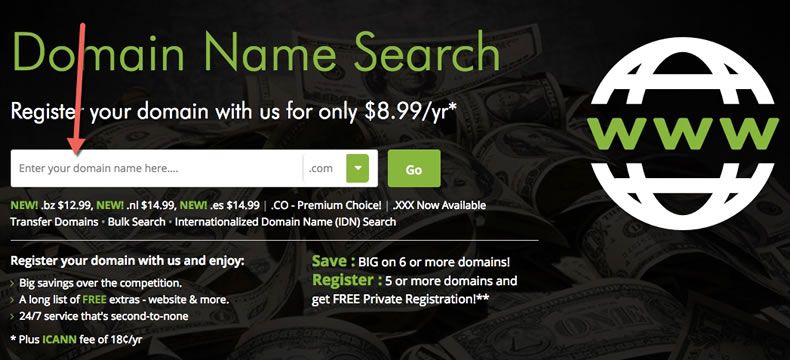How to Pick the Right Domain Name
- David
- March 7th, 2013
 How many times have you gone to visit a website and had a difficult time with getting the domain name right? Let's talk about a few simple questions you can ask yourself to determine if your domain name will help or hinder people trying to find or remember your site.
How many times have you gone to visit a website and had a difficult time with getting the domain name right? Let's talk about a few simple questions you can ask yourself to determine if your domain name will help or hinder people trying to find or remember your site.
Will I need more than one domain, or will one be enough?
For the average blogger, one is usually sufficient, but for companies doing business online, it may be a smart choice to acquire different versions of the domain name and have them redirect to a single main version. An organization called New England Trucking, Ltd that is known in the industry as NET Ltd might try "newenglandtruckingltd.com", "netruckingltd.com", "netltd.com", and "newenglandtruckinglimited.com". All of these are ways that people might enter their names into the address bar, and by choosing them all, the company is sure to be found by nearly everyone. The shorter versions of the domain name are easier to remember and can be put on a business card without taking up too much space.
Does the name communicate my message?
We've all heard the funny story--the site that chooses a name that is intended to say one thing but could be interpreted as something completely different. Remember "childrenslaughter.net"? The meaning might have been "Children's Laughter" but once you see "Children Slaughter", it's hard to unsee! Write out your domain name and make sure it's not going to give the entirely wrong impression when the spaces are removed. Be extra-careful with this when using abbreviations…you might end up with an unintended curse word that lands you on a blacklist of vulgar sites.
Is this a name that I can live with for a long time?
Just like your business name, your domain name should be carefully considered. You're going to spend money on this and, like your business name, it will be hard to change later. Choose a name that you are willing to stay with for the long haul, something that will stand up even years down the road. Putting a year in your name may sound futuristic now, but think of how outdated all those "2000" or "y2k" sites sound now that we're long past the turn of the millennium.
How do I create a unique domain name without sacrificing clarity?
Each domain is unique, and there are millions of domains already in use today. This makes it harder to come up with new ones, especially for businesses with common words in their titles. The old way used to be to add a hyphen between words, or to incorporate "Leetspeak" (the use of numbers in place of some letters, such as 1 for "I" and 3 for "E") to make the words unique. The downside of this is that it is highly informal and can needlessly complicate the viewer's search.
Try instead to come up with a concise two- or three-word phrase that incorporates your website's purpose or theme. A coffeeshop and a divorce lawyer who each use the business name "Common Grounds" could both have domain names, "commongroundscoffee" and "commongroundsattorney".
Adding a location is another easy way to make your domain name unique. Two unaffiliated businesses might have the exact same name but are located in different parts of the country. Now you can have "commongroundscoffeemd" for the one in Maryland, and "commongroundscoffeeaz" for the one in Arizona.
This can be used in conjunction with the first question above, where the coffeeshop might also register "coffeecommongrounds" in addition to their main domain, just in case someone doesn’t remember that the word "coffee" comes at the end.



